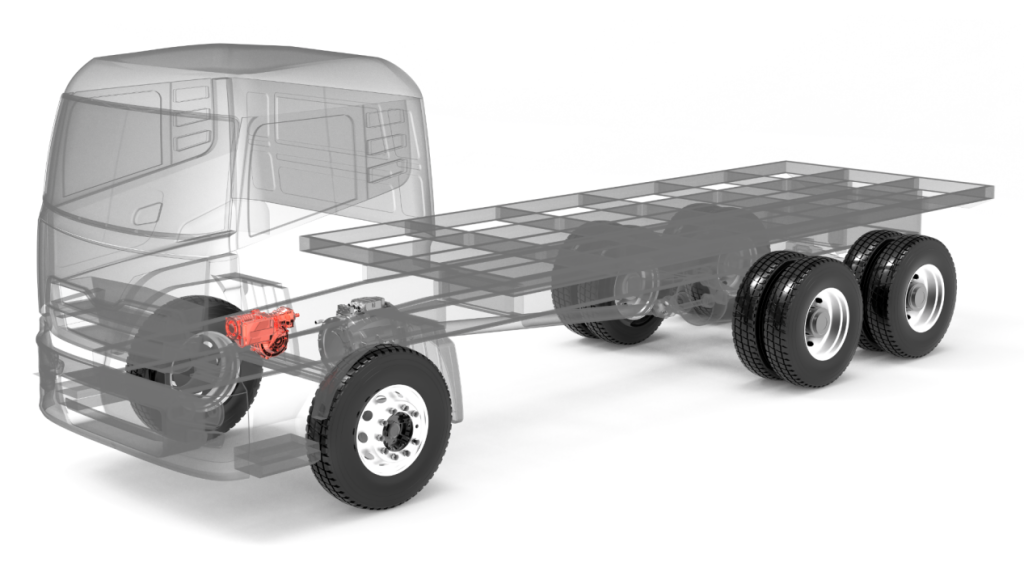The Electric Power Steering (EPS) system in commercial vehicles is a technology designed to assist the driver in steering the vehicle. It has become an important component in modern commercial vehicles, including trucks, buses, and vans, leading the new trend of electric steering-by-wire for commercial vehicles.

The Advantages of AEAUTO Electric Power Steering Technology
Assisted steering
1)Reduce driver effort: In commercial vehicles, especially large trucks and buses, turning the wheels can be extremely difficult due to the large mass and size of the vehicle. The power steering electric system provides an appropriate amount of assistive torque, making it easier for drivers to turn the steering wheel, whether during low – speed maneuvers such as parking or high speed driving.
2)Variable assist: At low speeds, such as when making sharp turns in a narrow loading area or garage, the power steering electric system can provide a relatively large amount of steering assist to enable the driver to easily turn the wheels with less force. As the vehicle speed increases, the amount of assist gradually decreases to ensure the driver has a proper feel for the road and vehicle stability.
Improve vehicle handling and stability
- Corrective steering assistance: If the vehicle meets unexpected road conditions, such as a side wind or a sudden change in road surface slope, the power steering electric system can provide corrective torque to help the driver keep the vehicle on the intended course. For example, when a strong cross-wind blows against a commercial vehicle, the power steering electric can subtly adjust the steering assist to counteract the force of the wind and maintain straight line stability.
- Enhanced cornering stability: During cornering, the electric power steering systemcan optimize the distribution of steering assist torque according to factors such as vehicle speed, steering angle, and yaw rate.
Integration with vehicle safety system
- Compatibility with active safety features: It can be integrated with other advanced driver-assistance systems (ADAS), such as lane-keeping assist and collision avoidance systems.If the lane-keeping assist system detects that the vehicle is drifting out of its lane, it can communicate with the system to provide a gentle steering correction to keep the vehicle within the lane boundaries.
- Fault-tolerant and safety-related functions: Itis designed with built-in self-diagnosis capabilities. If the system detects a fault, it can take appropriate measures such as reducing assist gradually and alerting the driver to ensure the safety of the vehicle operation. It can also enter a “limp-home” mode, allowing the driver to safely control the vehicle to a repair location.
Energy efficiency
Power consumption optimization: Compared to traditional hydraulic power steering systems, the system in commercial vehicles consumes power only when it actually requires steering assistance.This helps to reduce the overall energy consumption of the vehicle, which is especially important for commercial vehicles in terms of reducing operating costs and increasing fuel efficiency or battery range in the case of electric commercial vehicles.
Challenge and Consideration
Power Requirements
Commercial vehicles are large and heavy, which means that the EPS system needs to be designed to handle high torque requirements. This may require more powerful electric motors and robust power supply systems, especially for heavy duty trucks.
Reliability and Durability
Given the long – haul and often harsh operating conditions of commercial vehicles, the EPS system must be highly reliable and durable. Components need to be able to withstand vibrations, extreme temperatures, and continuous use without frequent breakdowns.
Cost-Effectiveness
While EPS systems offer many benefits, the initial cost of installation and maintenance can be a concern for commercial vehicle operators. Manufacturers need to balance the cost of the system with the long – term savings in fuel efficiency and improved safety.
AEAUTO is constantly researching and developing advanced EPS system for commercial vehicles. By leveraging cutting-edge technology and engineering expertise, AEAUTO aims to provide high – quality, reliable, and cost-effective EPS solutions that not only meet but exceed the expectations of commercial vehicle operators. Through continuous innovation, AEAUTO is driving the evolution of commercial vehicle steering technology towards a more efficient, safe, and sustainable future.
